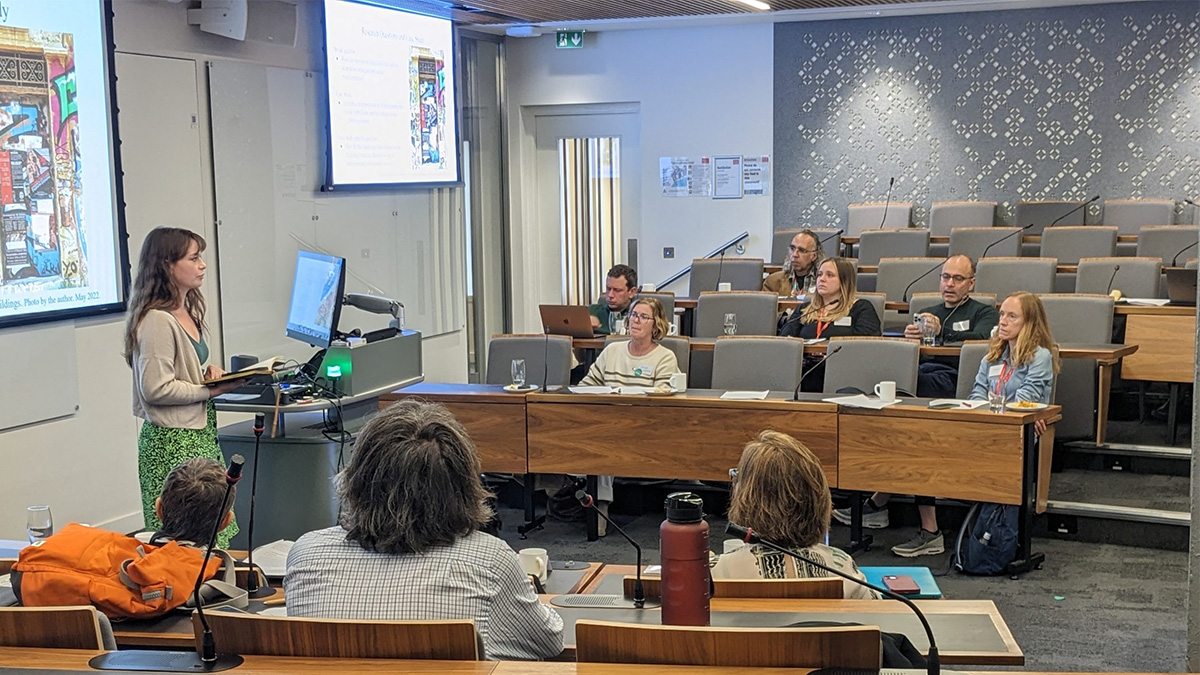Carolina grad students advance scholarship with King’s College London
Tar Heel students and faculty went abroad to participate in workshops with one of Carolina's strategic partners.

This May and June, more than 30 UNC-Chapel Hill graduate students advanced their research and gained valuable career skills by organizing and participating in academic workshops with graduate students at Carolina’s strategic partner, King’s College London. Participating Carolina departments included geography, global studies, history, music, philosophy and religious studies, and 14 UNC-Chapel Hill faculty members joined the students for the workshops in London.
Since 2010, hundreds of Carolina graduate students have organized annual workshops with KCL through numerous departments in the College of Arts & Sciences.
Students from each institution work together to organize the workshops and contribute their scholarship, presenting research papers and offering feedback alongside faculty experts.
Noreen McDonald, senior associate dean for social sciences and global programs in the College of Arts & Sciences, said that the workshops are a valuable opportunity for Carolina’s graduate students to develop the necessary skills and experiences to become global leaders.
“The exchange of knowledge, perspectives and ideas with an international audience fosters a deeper understanding of topics they’re covering and enhances their ability to navigate complex global challenges,” she said. “By engaging in these collaborative initiatives, our students not only enhance their academic journey but also develop the essential skills and connections required to shape a better world.”
The workshop themes focused on specific disciplines but all discussed issues of current global interest, such as conflict, decolonization and the environment.
Kylie Broderick, a doctoral candidate and Mellon Fellow in modern Middle East history, organized the history department’s 13th annual Transatlantic Historical Approaches workshop on the theme “(Dis)unity,” which tackled community, solidarity, separation and conflict across contemporary and historical society.
Broderick said that the Carolina-KCL workshop offered valuable skills and experience.
“I think that providing this space for grad students to safely test out their work, on the one hand, or to learn how to organize scholarly events, on the other, remains important,” she said. “Co-organizing the UNC-KCL workshop has given me new experiences and perspectives in how to do this effectively, with an eye to how events like these can really benefit grad students.”
As part of the history department’s tradition, the May conference at KCL will be followed by a conference at UNC-Chapel Hill in September.
Elizabeth Olson, department chair and professor of geography, organized a joint workshop on feminist, decolonial and critical methodological approaches to the study of the Global South with UNC-Chapel Hill graduate students Ingrid Diaz Moreno and Andreina Malki. According to Olson, organizing and participating in the workshops creates career and academic opportunities for students.
“Developing a proposal, working out the challenges of travel and coordination and then traveling to London to meet with students and faculty around a shared topic of interest opens so many doors for them,” she said. “Once they are participating in the workshops, we’ve found that they learn about new bodies of relevant scholarship and different approaches to organizing an academic career. It really improves their higher education literacy and hopefully encourages them to continue these kinds of connections in the future.”
Olson believes that engaging with global partners advances the scholarship and careers of Carolina faculty as well.
“For our faculty, and especially our junior faculty, the KCL workshop model provides an incentive for building new relationships with scholars in London,” she said. “It opens new options and promotes new ideas for future research, collaborative writing, and importantly, it raises the profile of our faculty and that of their really inspiring research.”
Some departments continued old traditions, and others started new ones. The music department organized the 12th convening of the Joint Graduate Student Music Conference with KCL in London, planned by two UNC-Chapel Hill doctoral candidates, Melissa Camp and Tara Jordan, and two KCL graduate students. The Curriculum in Global Studies conducted a KCL workshop for the first time on the theme of “Living in/with Crisis: Exploring Political, Economic, Social and Ecological Formations for More Just Futures.”
Other Carolina-KCL workshops covered an array of topics. The religious studies department convened on the theme of “Perspectives on the Self in Ancient Mediterranean Religions,” and the philosophy department’s students examined “Knowing and Doing,” which encompassed epistemology, ethics and social and political philosophy.
Support for the majority of the workshops came from the Institute for the Arts and Humanities King’s College Fund, which supports projects and collaborative events that advance the relationship between UNC-Chapel Hill and KCL.




